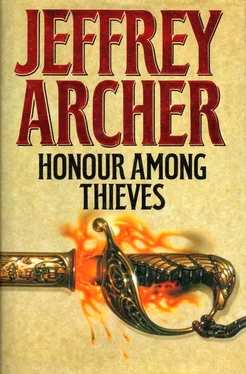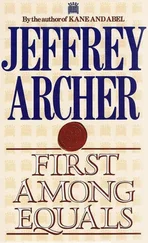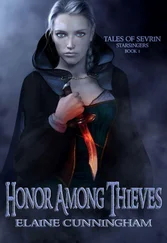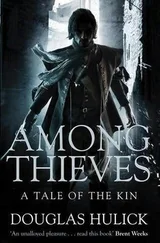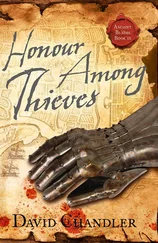It was Scott who saw them first. He tapped Dexter on the shoulder and pointed ahead of him. A television crew was standing in the front of a long line outside the main door of the National Archives.
“We’ll never get past them,” said Dexter. Turning to Mendelssohn, he asked, “Are there any alternative routes into the building?”
“There’s a delivery entrance on 7th Street,” replied Mendelssohn.
“How appropriate,” said Dexter Hutchins.
“Drive past the front door and then drop me off on the corner,” said the Conservator. “I’ll cross Constitution and go in by the side door.”
“Drop you off on the corner?” said Dexter in disbelief.
“If I’m surrounded by agents, everyone will...” began Mendelssohn.
“Yes, yes, yes,” said the Deputy Director, trying to think. He picked up the phone and instructed the two other cars to peel off.
“We’re going to have to risk it,” said Scott.
“I know,” said Dexter. “But at least you can go with him. After all, you’ve never looked like an agent.” Scott wasn’t sure whether he should take the remark as a compliment or not.
As they drove slowly past the National Archives, Dexter looked away from the impatient camera crew.
“How many of them?” he asked.
“About six,” said Scott. “And I think that must be Shaw with his back to us.”
“Show me exactly where you want the car to stop,” said the Deputy Director, turning to face Mendelssohn.
“Another fifty yards,” came back the reply.
“You take the bag, Scott.”
“But...” began Mendelssohn. When he saw the expression on Dexter Hutchins’s face, he didn’t bother with a second word.
The car drew into the curb and stopped. Scott grabbed the bag, jumped out and held the door open for Mendelssohn. Eight agents were walking up and down the sidewalk trying to appear innocent. None of them was looking towards the steps of the National Archives. The two unlikely looking companions quickly crossed Constitution Avenue and began running up 7th Street.
When they reached the delivery entrance, Scott came face to face with an anxious Calder Marshall, who had been pacing back and forth at the bottom of the ramp.
“Thank God,” was all the Archivist said when he saw Scott and the Conservator running down the ramp. He led them silently into the open freight elevator. They traveled up two floors and then ran along the corridor until they reached the staircase that led down to the vault. Marshall turned to check that the two men were still with him before he began running down the steps, something no member of staff had ever seen him do before. Scott chased after the Archivist, followed by Mendelssohn. None of them stopped until they reached a set of massive steel doors.
Marshall nodded, and a slightly breathless Conservator leaned forward and pressed a code into a little box beside the door. The steel grid opened slowly to allow the three of them to enter the vault. Once they were inside, the Conservator pressed another button, and the door slid back into place.
They paused in front of the great concrete blocks that had been built to house the Declaration of Independence, just as a priest might in front of an altar. Scott checked his watch. It was 9:51.
Mendelssohn pressed the red button and the familiar clanking and whirling sound began as the concrete blocks parted and the massive empty glass casing came slowly into sight. He touched the button again when the frame had reached chest height.
The Archivist and the Conservator walked forward while Scott unzipped the bag. The Archivist took two keys from his jacket pocket and passed one over to his colleague. They immediately set about unlocking the twelve bolts that were evenly spaced around the thick brass rim. Once they had completed the task they leaned over and heaved across the heavy frame until it came to rest like an open book.
Scott removed the container and passed it over to the Archivist. Marshall eased the cap off the top of the cylinder, allowing Mendelssohn to carefully extract the parchment.
Scott watched as the Archivist and the Conservator slowly unpeeled the Declaration of Independence, inch by inch, onto the waiting glass, until the original parchment was finally restored to its rightful place. Scott leaned over and took one last look at the misspelled word before the two men heaved the brass cover back into place.
“My God, the British still have a lot to answer for,” was all the Archivist said.
Calder Marshall and the Conservator quickly tightened up the twelve bolts surrounding the frame and took a step back from the Declaration.
They paused for only a second while Scott checked his watch again. 9:57. He looked up to find Marshall and Mendelssohn hugging each other and jumping up and down like children who had been given an unexpected gift.
Scott coughed. “It’s nine fifty-eight, gentlemen.” The two men immediately reverted to character.
The Archivist walked back over to the concrete blocks. He paused for a moment and then pressed the red button. The massive frame rose, continuing its slow journey upward to the gallery on the ground floor to be viewed by the waiting public.
Calder Marshall turned to face Scott. A flicker of a smile showed his relief. He bowed like a Japanese warrior to indicate that he felt honor had been satisfied. The Conservator shook hands with Scott and then walked over to the door, punched a code into the little box and watched the grid slide open.
Marshall accompanied Scott out into the corridor, up the staircase and back down in the freight elevator to the delivery entrance.
“Thank you, Professor,” he said as they shook hands on the loading dock. Scott loped up the ramp and turned to look back once he had reached the sidewalk. There was no sign of the Archivist.
He jogged across 7th Street and joined Dexter in the waiting car.
“Any problems, Professor?” asked the Deputy Director.
“No. Not unless you count two decent men who look as if they’ve aged ten years in the past two months.”
The tenth chime struck on the Old Post Office Tower clock. The doors of the National Archives swung open and a television crew charged in.
The Deputy Director’s car moved out into the center of Constitution Avenue, where it got caught up between the floats for Tennessee and Texas. A police officer ran across and ordered the driver to pull over into 7th Street.
When the car came to a halt, Dexter wound down his window, smiled at the officer and said, “I’m the Deputy Director of the CIA.”
“And I’m Uncle Sam,” the officer replied as he began writing out a ticket.
The Deputy Director of the CIA phoned the Director at home to tell him that it was business as usual at the National Archives. He didn’t mention the traffic ticket.
The Conservator phoned his wife and tried to explain why he hadn’t come home the previous night.
A woman holding a carrier bag with a rope handle contacted the Iraqi Ambassador to the UN on her mobile phone and let him know that she had killed two birds with one stone. She gave the Ambassador an account number for a bank in the Bahamas.
The Director of the CIA rang the Secretary of State and assured him that the document was in place. He avoided saying “back in place.”
Susan Anderson rang Scott to congratulate him on the part he had played in restoring the document to its rightful home. She also mentioned in passing the sad news that she had decided to break off her engagement.
The Iraqi Ambassador to the UN instructed Monsieur Dummond to transfer the sum of nine hundred thousand dollars to the Royal Bank of Canada in the Bahamas and at the same time to close the Al Obaydi account.
Читать дальше
